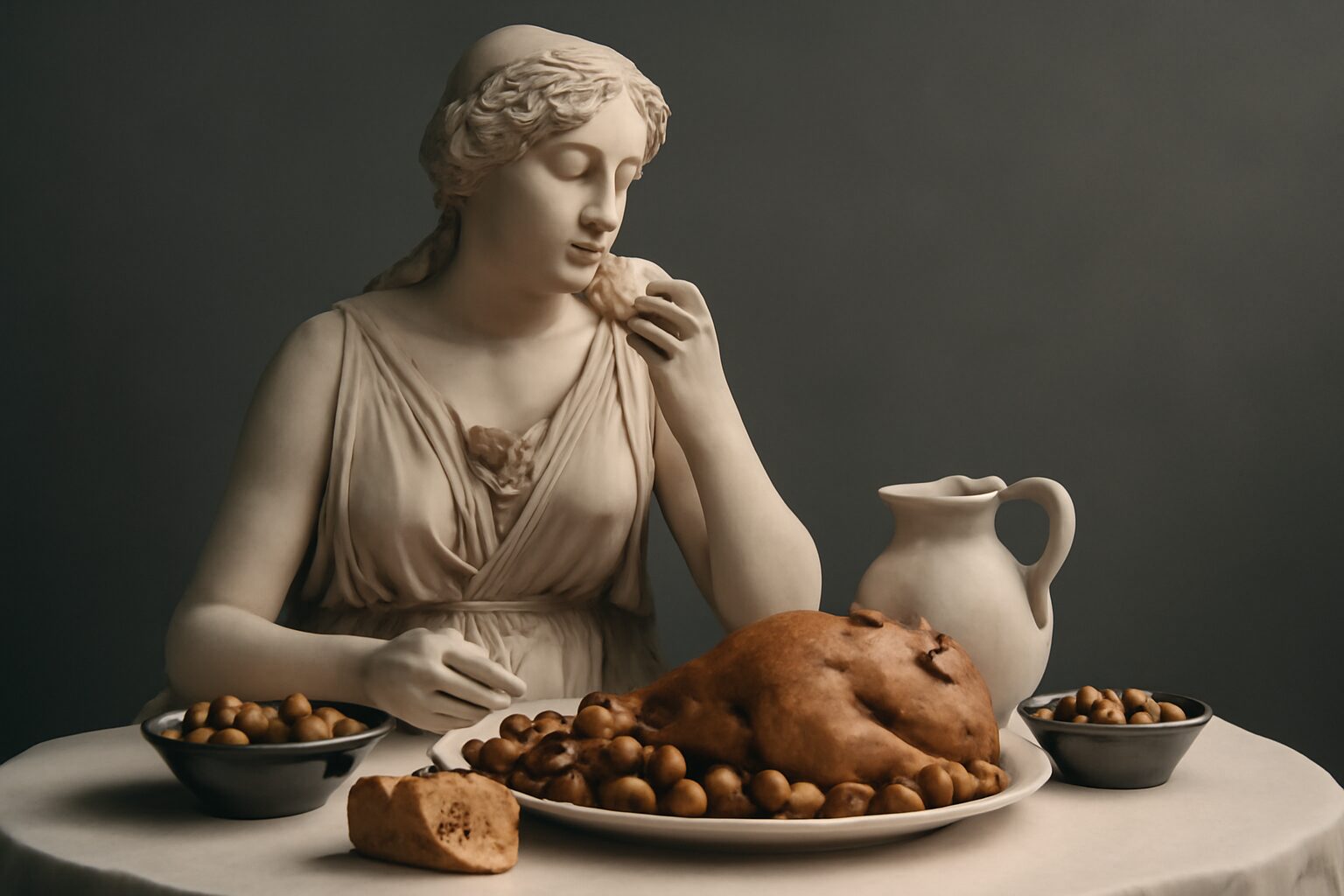Adephagia: The Greek Goddess of Gluttony
In the rich tapestry of Greek mythology, Adephagia stands as a lesser-known but fascinating deity. She personifies gluttony and insatiable hunger, embodying the primal urge to consume beyond necessity. While not as prominent as the Olympian gods, Adephagia's presence highlights the Greeks' recognition of both virtue and excess in human nature.
Origins and Mythology
Adephagia's origins are obscure, with few surviving myths directly involving her. She is often associated with Gaia (Earth) or Demeter (goddess of agriculture), as her domain intersects with the abundance—and overindulgence—of food. Unlike deities who represent moderation, Adephagia symbolizes the unrestrained appetite that disrupts balance.
One of the rare mentions of Adephagia comes from the cult of Demeter in Sicily, where she was worshipped alongside the goddess of harvest. Here, she served as a cautionary figure, reminding devotees of the dangers of excess even in times of plenty.
Powers and Symbolism
Adephagia's power lies in her ability to incite uncontrollable hunger, driving mortals (and even gods) to consume beyond their limits. She represents the darker side of abundance—where feasting turns to greed, and nourishment becomes obsession.
Her symbols include overflowing cornucopias, half-eaten feasts, and sometimes a grotesquely distended stomach. Unlike gods of famine, such as Limos, Adephagia's influence is not about lack but about the inability to stop consuming.
Relationships and Cultural Significance
Adephagia's role in Greek mythology is often linked to other deities of excess, such as Dionysus (god of wine and revelry) and Hedone (goddess of pleasure). Together, they embody the fine line between enjoyment and overindulgence.
Her presence in Sicilian cults suggests she may have been a localized figure, perhaps reflecting societal concerns about food scarcity or the moral consequences of gluttony. In a culture that prized balance (sophrosyne), Adephagia served as a warning against surrendering to base desires.
Though rarely depicted in art or literature, Adephagia's legacy endures as a reminder of the ancient Greeks' nuanced understanding of human nature—celebrating abundance while cautioning against its misuse.
Alternative Names for Adephagia
God Name: Adephagia (Greek)
The primary name of the goddess representing gluttony in Greek mythology.
God Name: Edacitas (Roman)
The Roman equivalent of Adephagia, representing insatiable hunger or gluttony, though less commonly referenced in Roman texts.
God Name: Boulimia (Greek)
An alternative Greek name sometimes associated with excessive hunger, though not directly a name of the goddess Adephagia, it is conceptually related.
Tales about Adephagia
The Feast of the Gods
When Zeus declared a grand feast on Mount Olympus to celebrate the victory over the Titans, the gods prepared an extravagant banquet. However, as the festivities began, they realized the food was disappearing at an alarming rate. Adephagia, the spirit of gluttony, had been drawn to the divine aromas and was consuming everything in sight. Zeus, amused rather than angered, watched as she devoured ambrosia and nectar meant for hundreds. He raised his thunderbolt not in wrath, but to toast her insatiable appetite, declaring, "Let her feast be a symbol of our boundless prosperity!" From that day, Adephagia was honored at the start of every divine gathering, ensuring that no god would ever know hunger.
The Hunger of the Underworld
One bleak era, the souls in the Underworld grew restless, their hunger echoing through the realms. Hades, troubled by the discontent, sought a solution. He summoned Adephagia to his shadowy kingdom. "Your endless appetite can teach these souls the nature of desire," he proclaimed. Adephagia descended, and wherever she tread, the pangs of hunger intensified, yet she also showed that satisfaction lies in the pursuit, not just the consumption. The souls, understanding this paradox, found peace in their cravings. Hades, grateful, granted her a place among his court, where she reminds all that even in death, the hunger for life persists.
Frequently Asked Questions
Who is Adephagia in Greek mythology?
Adephagia is the Greek personification (daimon) of gluttony and excessive eating. She represents the concept of overindulgence in food and was often depicted as a minor spirit associated with negative behaviors.
What is the significance of Adephagia in Greek culture?
Adephagia served as a moral reminder in Greek culture about the dangers of excess and lack of self-control. Her personification helped Greeks understand and discuss the consequences of gluttony and unrestrained desires.
How does Adephagia relate to other Greek daimones (spirits)?
Adephagia belongs to a group of Greek daimones (spirits) that personify human behaviors and emotions. Like other daimones, she represents a specific aspect of human nature - in this case, the negative trait of overeating and lack of moderation.
What lessons can we learn from Adephagia today?
Adephagia's story teaches modern audiences about the importance of moderation and self-control. While ancient Greeks saw her as a warning against gluttony, today we can apply this concept to various forms of overconsumption and addictive behaviors.
Are there any myths or stories about Adephagia?
Unlike major Greek gods, Adephagia doesn't appear in prominent myths. She was more of a conceptual personification rather than a character in stories. Her importance lies in representing an abstract idea rather than participating in mythological narratives.













